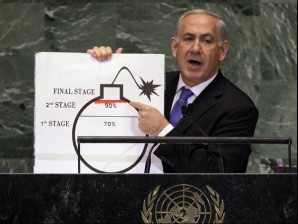Netanyahu: Europe support for Palestinians ‘endangers Israel’
PARIS, France – Israeli Prime Minister Benjamin Netanyahu accused European governments on Monday of siding with the Palestinians over their latest UN bid for statehood, saying their demands would endanger his country.
“I said that the attempts of the Palestinians and of several European countries to force conditions on Israel will only lead to a deterioration in the regional situation and will endanger Israel,” the prime minister said in a statement.
“Therefore, we will strongly oppose this.”
The comments followed almost three hours of talks in Rome between Netanyahu and US Secretary of State John Kerry, who jetted across western Europe on Monday for a hectic round of diplomatic meetings on the topic.
A State Department official said Kerry and Netanyahu “had a long and thorough discussion about Israel’s security and developments at the United Nations.”
Article continues after this advertisementThe Palestinians have said they will submit an Arab-backed draft text to the UN setting a two-year deadline for Israeli troops to withdraw from Palestinian lands as early as Wednesday.
Article continues after this advertisementFrance has put forward a more nuanced version setting a two-year timetable for concluding a peace treaty, without mentioning the withdrawal of Israeli forces.
From Rome, Kerry flew into Paris for a late-night dinner meeting with the foreign ministers of France, Britain and Germany inside the airport on a short stopover on his way to London, seeking clarification on the French-led resolution bid.
Traditionally the US has used its power of veto at the UN Security Council to shoot down what it sees as moves against its close regional ally, Israel.
US officials told reporters accompanying Kerry that Washington has not yet decided whether to veto or back the French-led UN initiative.
“There are certain things we would never support,” said the State Department official, without elaborating.
French Foreign Minister Laurent Fabius told AFP they were looking for “a resolution which everyone can get behind.
“Even if the Palestinians have a text in their hand, the Americans have already said that they will veto it.”
Growing impatience
Netanyahu earlier said: “We will not accept attempts to dictate to us unilateral moves on a limited timetable.”
Jordan — which Palestinians said would submit their resolution — said it had no immediate plans to push for an early UN vote.
Its Ambassador Dina Kawar to the UN told reporters: “Secretary Kerry is having meetings in Europe with a number of ministers so we are waiting to see what happens.”
There is a growing impatience in Europe over the Israel’s recent actions and the failure to make progress in peace talks, amid fears the Middle East risks spiralling into even greater chaos.
Several European parliaments have called on their governments to move ahead with the recognition of a Palestinian state.
The US administration opposes moves to bind negotiators’ hands through a UN resolution — particularly any attempt to set a deadline for the withdrawal of Israeli troops from the West Bank.
But a US veto risks running contrary to Washington’s avowed aim of a Palestinian state and would anger key Arab allies — many of whom are much-needed partners in the US-led coalition against Islamic State militants.
“We will stand firm in the face of any diktat,” the Israeli leader said ahead of Monday’s talks.
Kerry left for London where he was due to meet chief Palestinian negotiator Saeb Erakat and the secretary general of the Arab League, Nabil al-Arabi, on Tuesday.
France’s Fabius is also to meet with Arabi on Tuesday.
Diplomatic sources say Paris is hoping to persuade the Palestinians to back their compromise resolution, rather than risk a US veto of the more muscular Arab version.
But the Palestinians appear divided, as frustration grows over the snail’s pace of diplomatic efforts, with the decision resting with Palestinian President Mahmud Abbas.
RELATED STORIES
Israel charges American over plot to bomb Muslims
Nobel peace winners fear ‘new, more dangerous Cold War’
